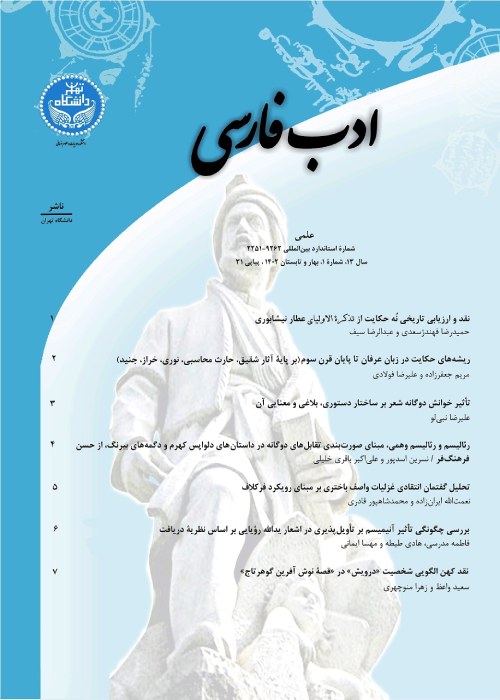Report a Plagiarism (Plagiarism of Risal al-Quds and Ghalatat al-Salekin by Qutb al-Din Jami in Hadiqa al-Haqiqah)
The purpose of writing this article is to report the different aspects of plagiarism. This plagiarism happened in the sixth century (A.H.) in the city of Torbat Jam in northeastern Iran. There, the successor and grandson of Sheikh Ahmad Jami, Qutb al-Din Muhammad Jami, stole two books from Rozbahan Baghli Shirazi (Rasala al-Quds and Ghalatat al-Salekin). Qutb al-Din Muhammad Jami was known among mystics and scholars of that time, and he was considered a mystical writer. Rozbahan lived before Qutbuddin. He is a great mystic. A mystic who has written more than fifty books. His books are taken all over Iran. It seems that Qutb al-Din was unaware of this issue. Qutb al-Din has included two books of Rozbahan in one volume and presented them to the audience under the name of Hadiqah al-Haqiyah. To start the work, it was necessary to determine who the books were written by. I have provided a lot of evidence to identify which author each book belongs to. In this article, I have determined with what tricks Qutb al-Din did this plagiarism. In order to hide his plagiarism, he asked the scholars of his time to confirm the authenticity of his writings. I have examined these confirmations from another point of view. I have also determined which manuscripts of Rozbahan's books he had access to. For this purpose, I have compared the manuscripts of the books. Qutb al-Din stole Rozbahan's books but did not agree with all his opinions. In the investigation of this plagiarism, I have examined the difference in the views of these two people. These differences can be called ideological differences. This article is done by descriptive analytical method. Examining and comparing Roozbahan's books with Qutb al-Din Muhammad's Hudiq al-Haqiq shows that he stole Rozbahan's Risal al-Quds and Ghalatat al-Salekin, with minor changes, and presented them in his own name. The concern of convincing the audience has caused Qutb al-Din to change some signs of dependency of Rozbahan's books and remove others in a process that we have called the process of personalization. The most important characteristics of personalization of the text are: removing Rozbahan's rejection, modifying some of his views, extensive quoting of poems attributed to Sheikh Jam's family, adding the text of Sheikh Jam's treatises and adding personal views; In addition, in order to stay away from the disciples' question, he has asked the elders approved by Sheikh Jam's family to confirm that the text of Hadiqa al-Haqiyah is in accordance with Mustafa's Shariah; But now we know that Qutb al-Din, in this way, sought to prove the dependence of this work on himself and remove the accusation of plagiarism. The issue of including the poems of Sheikh Jam and his family in Hadiqah is also one of the issues to consider. By comparing the poems in the treatises and Hadiqa, it became clear that Qutb al-Din did not follow the trust in attributing poems and attributed other people's poems to Sheikh Ahmad Jam. Based on this, the attribution of the poems to the narrators claimed by Qutb al-Din is seriously doubtful. Some changes applied in the course of this plagiarism have gone beyond a simple difference and can be called an ideological difference. Differences in topics such as al-Tabas, unity, hearing, the expression of mystical experiences and the issue of vision are among these ideological differences. The revelation of this plagirismalso helps to examine the etymology of Rozbahan treatises. In this way, by examining the degree of correspondence between the versions of Risal al-Quds and Ghalatat al-Salekin with Hadiqa al-Haqiqah, we can approach the original version of Rozbahan's treatises. In the review of the versions, it was found that version "A", which was written in 817-822 A.H., is the closest version to the versions of Hadiqa al-Haqiqah and the closest version to the version approved by Rozbahan.
- حق عضویت دریافتی صرف حمایت از نشریات عضو و نگهداری، تکمیل و توسعه مگیران میشود.
- پرداخت حق اشتراک و دانلود مقالات اجازه بازنشر آن در سایر رسانههای چاپی و دیجیتال را به کاربر نمیدهد.



